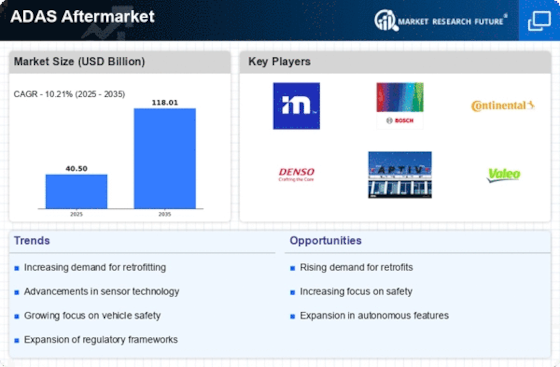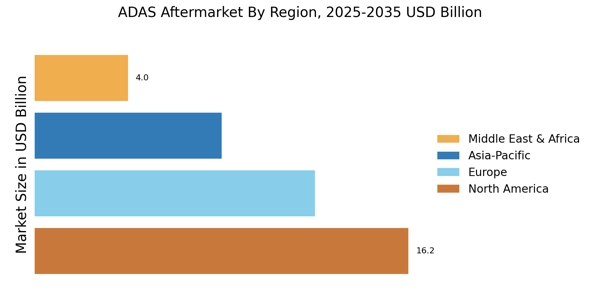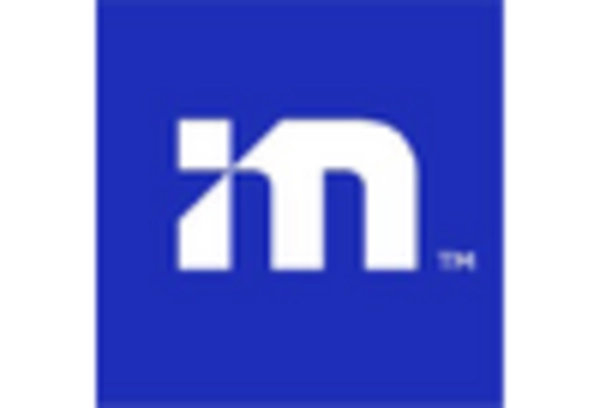Regulatory Compliance
The increasing emphasis on safety regulations is a pivotal driver for the ADAS Aftermarket Market. Governments are implementing stringent safety standards for vehicles, which necessitates the integration of advanced driver-assistance systems. For instance, regulations mandating the installation of features such as automatic emergency braking and lane-keeping assistance are becoming commonplace. This regulatory landscape compels vehicle manufacturers and aftermarket suppliers to adapt their offerings, thereby expanding the ADAS Aftermarket Industry. As a result, the market is projected to witness substantial growth, with estimates suggesting a compound annual growth rate of over 10% in the coming years. Compliance with these regulations not only enhances vehicle safety but also drives innovation within the industry.
Technological Integration
The rapid evolution of technology is significantly influencing the ADAS Aftermarket Market. Innovations in sensor technology, artificial intelligence, and machine learning are enhancing the capabilities of driver-assistance systems. As vehicles become increasingly equipped with sophisticated ADAS features, the demand for aftermarket solutions that can integrate seamlessly with these technologies is rising. For example, the integration of advanced sensors and cameras into existing vehicle models is becoming a common practice. This trend is expected to propel the ADAS Aftermarket Industry, with market analysts projecting a valuation exceeding 30 billion dollars by 2026. The continuous advancement in technology not only improves vehicle safety but also creates opportunities for aftermarket suppliers to offer enhanced products and services.
Growth of Autonomous Vehicles
The rise of autonomous vehicles is poised to be a transformative driver for the ADAS Aftermarket Market. As manufacturers invest heavily in developing self-driving technologies, the demand for advanced driver-assistance systems is expected to surge. This growth is not merely speculative; market analysts predict that the autonomous vehicle segment could account for over 25% of the automotive market by 2030. Consequently, the ADAS Aftermarket Industry must adapt to accommodate the complexities associated with autonomous systems. This includes the need for specialized maintenance, upgrades, and retrofitting solutions. The evolution towards autonomy presents both challenges and opportunities, as suppliers must innovate to meet the demands of a rapidly changing automotive landscape.
Increased Vehicle Electrification
The trend towards vehicle electrification is emerging as a significant driver for the ADAS Aftermarket Market. As more manufacturers shift towards electric and hybrid vehicles, the integration of advanced driver-assistance systems becomes increasingly vital. Electric vehicles often come equipped with sophisticated ADAS features, which necessitate specialized aftermarket solutions for maintenance and upgrades. This shift is expected to create new opportunities within the ADAS Aftermarket Industry, as suppliers develop products tailored to the unique requirements of electric vehicles. Market forecasts suggest that the electrification of vehicles could lead to a 15% increase in demand for ADAS aftermarket products by 2027. The intersection of electrification and advanced safety technologies is likely to redefine the aftermarket landscape.
Consumer Demand for Safety Features
Consumer preferences are shifting towards vehicles equipped with advanced safety features, which is a crucial driver for the ADAS Aftermarket Market. As awareness of road safety increases, consumers are actively seeking vehicles that offer enhanced driver-assistance technologies. This trend is reflected in market data, indicating that nearly 70% of consumers prioritize safety features when purchasing a vehicle. Consequently, the demand for aftermarket solutions that can upgrade existing vehicles with ADAS capabilities is on the rise. This consumer-driven demand is likely to stimulate growth in the ADAS Aftermarket Industry, as suppliers respond by developing innovative products that cater to these preferences. The focus on safety not only influences purchasing decisions but also shapes the future landscape of the automotive market.

















